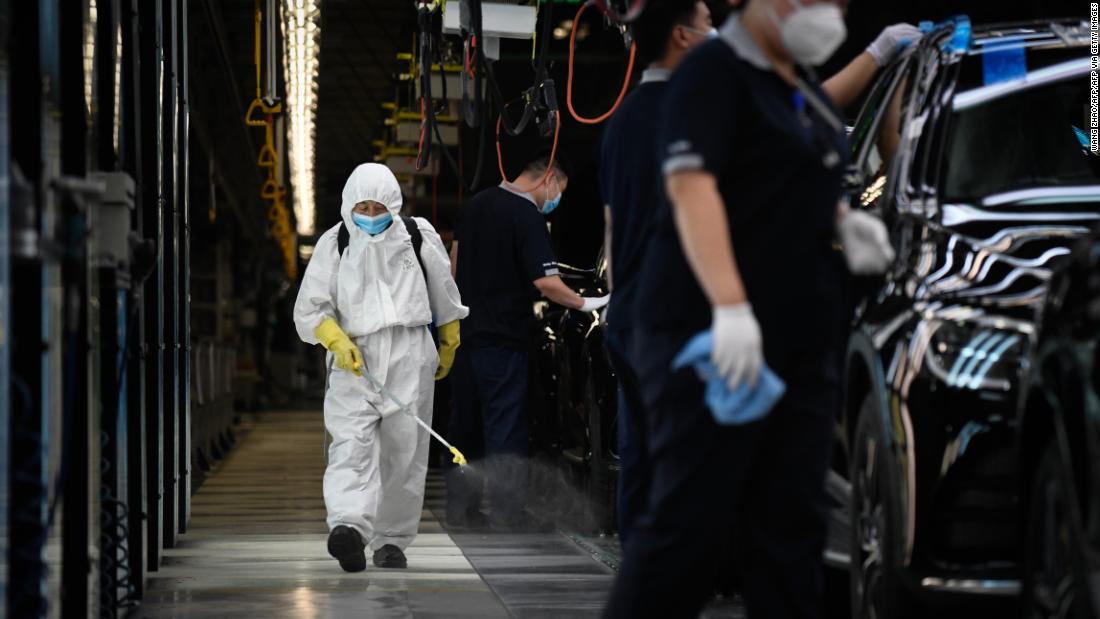


China's disease control authorities have launched pilot systems to monitor and report cases of Human Metapneumovirus (HMPV), which has been linked to a recent flu outbreak. As the country continues to battle this respiratory virus, the World Health Organization calls for transparency and cooperation in researching the origins of COVID-19 to better prevent and prepare for future epidemics. Experts warn that people with weak respiratory health and weakened immune systems, as well as young children and the elderly, are most at risk for HMPV and urge preventive measures such as frequent hand washing and wearing masks.
Human Metapneumovirus (HMPV): An Emerging Threat
Human Metapneumovirus (HMPV) is a respiratory virus that primarily affects the lower respiratory tract, including the bronchi and lungs. It is highly contagious and can spread through close contact with infected individuals, respiratory droplets, or contaminated surfaces.
Background
HMPV was first identified in the Netherlands in 2001 and has since become a common cause of respiratory illness worldwide. It is particularly prevalent during the winter months and can cause a range of symptoms, including:
In severe cases, HMPV can lead to pneumonia, bronchiolitis, or hospitalization. Infants, young children, the elderly, and individuals with weakened immune systems are at highest risk for serious complications.
China's Surveillance and Response
In response to a recent outbreak of HMPV, China's disease control authorities have launched pilot systems to monitor and report cases. This move reflects the country's commitment to enhancing public health surveillance and preparedness for respiratory viruses.
World Health Organization's Call for Transparency
The World Health Organization (WHO) has called for transparency and cooperation in researching the origins of COVID-19. This includes investigating the potential role of HMPV in the outbreak. Better understanding the origins of such viruses is crucial for preventing and preparing for future epidemics.
Top 5 FAQs
1. What are the symptoms of HMPV?
HMPV can cause a range of symptoms, including fever, cough, runny nose, sore throat, and difficulty breathing.
2. Who is most at risk for HMPV?
Infants, young children, the elderly, and individuals with weakened immune systems are at highest risk for serious complications from HMPV.
3. How does HMPV spread?
HMPV spreads through close contact with infected individuals, respiratory droplets, or contaminated surfaces.
4. Is there a vaccine for HMPV?
There is currently no vaccine available for HMPV.
5. How can I prevent HMPV?
Preventive measures for HMPV include frequent hand washing, wearing masks, covering coughs and sneezes, and avoiding close contact with infected individuals.

As winter arrives in India, so does the hazardous air pollution. Delhi NCR's AQI has already crossed the 400 mark, making it crucial to invest in air purifiers, especially after Diwali. Dyson, Qubo, HomePure, and Philips have launched high-quality air purifiers with advanced features to tackle different types of pollutants and create cleaner indoor air. With prices ranging from Rs 5,000 to Rs 1 lakh, these purifiers are a practical and timely purchase for a healthier living.

In a recent family vlog, Indian celebrity couple Shoaib Ibrahim and Dipika Kakar shared their "natural" hair care routine for their son, using a homemade mask made with rice flour, flax seeds, and coconut oil. However, experts warn that what works for adults may not be suitable for babies, whose sensitive skin and scalp could react to the ingredients. While the ingredients may improve hair texture, they do not necessarily promote hair growth. Instead, a healthy diet and good scalp care are more important in maintaining healthy hair.

A recent consumer study has found multiple brands of soft contact lenses in the U.S. to contain "forever chemicals" that can be harmful to both the body and the environment. The study, conducted by the nonprofit organization Environmental Health Sciences, tested 18 varieties of popular contact lenses and found all of them to contain markers for PFAS. Brands such as Acuvue, Alcon, and CooperVision were among the list of affected products. This news serves as a cautionary lesson on the potential risks of overusing contact lenses.

On the birth anniversary of Dr. APJ Abdul Kalam, the ‘Missile Man’ of India, tributes pour in on social media celebrating his life, vision and impact. A visionary scientist, inspiring leader and true patriot, Dr. Kalam's humility, compassion and constant interaction with students continue to inspire generations. His tireless efforts in defense, science and youth empowerment have strengthened India's path towards self-reliance and his legacy continues to motivate young minds to dream big and work hard for the nation.

Recent studies have found that extreme heat, particularly when combined with high humidity, can have a significant impact on mental health. A study in India showed that when wet bulb temperature exceeded 27°C, the probability of reporting severe depression increased by 0.5%, even when the temperature was slightly lower. This finding is consistent with global reviews that have linked high temperatures to mood disorders, increased hospital admissions for psychiatric conditions, and even elevated suicide risk. The Lancet has also published evidence that rising temperatures worldwide are a growing threat to emotional and cognitive health.

In a meeting with university officials in Udaipur, Rajasthan Governor Hari Bhau Bagde stressed the importance of incorporating India's ancient knowledge traditions into academic research. He highlighted the deep repository of knowledge in India since ancient times and urged scholars and scientists to draw upon this tradition in their work. Bagde also suggested making ancient texts available in university libraries for study and research purposes, in order to shape the intellectual abilities and love for the nation among the younger generation.

John Clarke, Michel H. Devoret, and John M. Martinis have been awarded the 2025 Nobel Prize in Physics for their pioneering research into quantum mechanical tunnelling. Their discovery has opened new possibilities for quantum technologies, and will be formally presented on December 10, the anniversary of Alfred Nobel's death. This announcement follows the tradition of recognizing transformative contributions to science, and the award carries a prestigious prize of 11 million Swedish kronor.

The US-Japanese trio of Mary E Brunkow, Fred Ramsdell, and Shimon Sakaguchi have won the 2025 Nobel Prize in physiology or medicine “for their discoveries concerning peripheral immune tolerance". Through their research, they have shown how the immune system is kept in check and why serious autoimmune diseases do not affect everyone. Sakaguchi found a new class of T cells, while Brunkow and Ramsdell discovered the explanation behind a specific mouse strain's vulnerability to autoimmune diseases. Together, they have significantly advanced our understanding of immunology and autoimmune diseases.

Indian astronaut Shubhanshu Shukla, who recently completed a 20-day space mission, shared his insights and experiences at the convocation ceremony of Dr. APJ Abdul Kalam Technical University. He highlighted the importance of patience, focus, and the inevitability of change in achieving success, and urged the graduating class to actively contribute to shaping a fearless and ambitious India.

The Regional Meteorological Centre (RMC) in Chennai has issued a weather alert for parts of Tamil Nadu, with thunderstorms and light to moderate rainfall expected on Saturday. The alert was issued due to the strengthening of a cyclonic circulation in the Bay of Bengal, which is likely to intensify and form a low-pressure area. The system is expected to affect Tamil Nadu, Puducherry, and Karaikal, with some areas experiencing heavy rainfall and gusty winds. The public is advised to stay updated and take precautions, especially in hilly and western districts.